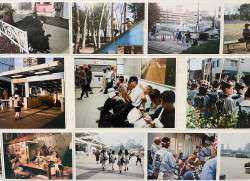
May 7, 2009
War Story
Gregory Hadley's Field of Spears recounts a dramatic—and little-known—episode from the closing days of World War II. Yet as the author discovered, the story didn’t finish with the war's end
By Metropolis

Author Gregory Hadley and farmer Choei Shimizu dig up the wreckage
The author eventually traveled to the US to meet several survivors, who provided copies of wartime diaries that he was able to quote in his narrative.
By interviewing the crew members, Hadley learned about their lives after the war. Navigator Milton Garin had become a successful New York businessman. Paul Trump, another navigator, became a Lutheran minister. The author describes these postwar careers in a lengthy epilogue, revealing that no matter how the lives of the crew unfolded, each man struggled with his wartime experience.
After Field of Spears was published, Hadley sent a copy to the one surviving crew member who had refused to talk to him. Walter Wiernik, the plane’s radio operator, now a recluse without even a telephone, quickly wrote back.
Apparently, the book helped Wiernik deal with some very painful memories, particularly of his captivity. This experience was something that the crew members, who had seldom met after the war, had kept to themselves, but confided to the diaries that Hadley had used in the book.
“It really made a difference to him,” the author recalls. “People are saying he’s a different person now. It’s not like an Ebenezer Scrooge sort of transformation, but some of that burden, some of that pain has been lifted from him.”
The one survivor that interested Hadley the most was Captain Jordan, whose postwar career was something of a mystery to the other men. Rumored to be an alcoholic, he had died in 1977 at the relatively young age of 59. When news of Hadley’s book reached Jordan’s hometown, people there put him in touch with the captain’s daughter. That’s when the fateful letter arrived.
Like Wiernik, Diana Jordan was a recluse—she didn’t even have a telephone. She was also dying of cancer. With some trepidation, Hadley opened her letter to find out what she and her brother felt about how he had portrayed their father.
“They were shocked and grateful to learn what he had gone through. It helped explain a lot,” says Hadley. “People say it gave her another year of life.”
In her letter, Diana Jordan recounted the day her father returned home from the war. For months, he had been presumed dead. When he got off the train, no one in his family recognized him. Gone were the Clark Gable moustache and the cheerful plump face. A thin, bald old man stood before them.
During his postwar years, the ex-bomber pilot tried his hand at everything from flying guns to South America to crop dusting cotton plants. When his drinking got the better of him, he managed a pizza parlor. “He didn’t battle alcoholism,” his daughter claimed, “he embraced it.”
But Diana Jordan’s most vivid memories had to do with the walks her father took them on during the dead of night, or how he often drove their car on an empty tank of gas, or turned it around to chase down a storm. She concluded that he just felt children needed to be scared sometimes. As she put it in her letter to Hadley: “They need to know there’s something out there that can take your father away in the night, something that can turn good people into monsters.”
Today, Hadley maintains that the effects of wartime experiences remain corrosive long afterward.
“It takes three generations for a culture to deal with a war. There’s the generation that goes through it. Then the one that has to deal with those traumatized people. And the third generation tries to understand it, to make a legacy of it.”
Fire in the Sky
A routine mission turns harrowing for the crew of an American bomber
By Gregory Hadley

Niigata residents had watched the searchlights drifting lazily to and fro, and then as one suddenly whipped across the sky to lock on to Jordan’s B-29. Many gasped, first in shock at the unexpected speed of the searchlight, and then again as they felt overwhelming waves of horror, hatred, awe and defeat at seeing Jordan’s sleek behemoth rumbling overhead. Their first impressions were something akin to, “How can we win against that?”
More searchlights rapidly began to tighten their grip on the Jordan Crew. Volleys of anti-aircraft fire started to burst around them with new vigor. Slowly, a red targeting spotlight drifted upwards and rested on the center of the plane. The onlookers below held their breath, waiting to see what would happen. In a few more seconds the B-29 would be too far away for a clear shot.
The crewmen onboard were also holding their breath. With the exception of [navigator Paul] Trump and [central fire controller Walter] Dickerson, everyone remembered what happened the last time they had been caught in the searchlights on that terrifying mission over Tokyo. Like then, darkness had been their friend. At this low altitude, in their huge and sluggish B-29, they were again in extreme danger. All the Jordan Crew could do now was to try and run the gauntlet of flak. Air crews from the other B-29s who had finished their runs could only look on helplessly at what was to happen next.
A shudder went through the entire plane. The crew looked out to confirm their worst fears. The inner nacelle of their left wing was smoking. They had been hit.
On the ground, the inhabitants of Niigata and the surrounding villages saw the flak hit its mark with a crack and a flash. There was a split second of disbelief, followed by shouts of, “Oh, look! It’s been hit! It’s burning! It’s going down!” Across the entire area people erupted into shouts of unrestrained delight, as if they were watching a summer fireworks display.
War stories are replete with tragic twists of fate. The tale of that early morning on July 20 is no exception. At the moment Jordan’s plane began to burn in the sky, an extraordinary transaction took place. What before had been for the citizens of Niigata an unassailable icon of death now had become a blazing symbol of hope. For the Jordan Crew, however, what had only moments before been for them a stronghold of American superiority now was rapidly becoming a brittle, burning deathtrap.
On the outskirts of Niigata, along the Agano River, in a small hamlet on the far side of the village of Yokogōshi known as Yakeyama (which in Japanese means, “Scorch Mountain”), a group of villagers were huddled together and shouting “Banzai.” One wit by the name of Kuwabara began to chant “Kuwabara, kuwabara, kuwabara,” which as a Japanese pun, also sounds like the words of an incantation used to chase away demons. People laughed at the irony as the American demons above were being exorcised from their skies. Very quickly, however, this impromptu party fell still as, one by one, they looked upward toward the sky with gaping stares of horror. The burning B-29 was headed straight towards them.
Jordan opened the engines up to full throttle as [bombardier Clinton] Wride shouted over the intercom, “I’m gonna get those lights!” He took control of the forward guns and started shooting at the searchlights below. One searchlight went out. “I got one!” Down below in the hamlet called Kawaneyauchi, the bullets rained down on the tile roofs of several homes. One bullet penetrated the roof of a house and shattered a kitchen cupboard inside.
Trump now gave Jordan the navigation readings that would take them back along the Agano River and towards the mountains. Jordan followed the readings and raced to escape the anti-aircraft batteries. He tried feathering the damaged propeller but it kept spinning. Apparently, flak had cut the oil lines and power to the controls. A friction-induced fire was beginning to flicker. It grew brighter. Any moment and the fuel lines in their left wing could catch fire. [Flight engineer George] McGraw anticipated that the fire might spread to both wings through the fuel lines, and from his control station cut off the fuel supply to the port inner engine and feathered its propeller. The fire ignored them.
Jordan put the plane into a series of sharp dives in an attempt to blow out the flames. After the third dive, the fire went out. The crew could not believe their luck. They breathed a collective sigh of relief.
It was too soon to feel fortunate. The flames flashed up again, this time with even greater ferocity, and spread to the belly of the plane. In the aft cabin, [left gunner Robert] Grant watched as the fire now began to melt the Perspex dome of his gun-aiming position.
“How is everything back there?” called Jordan on the intercom.
“We’re OK,” said Grant. “What’s happening up there?”
“We’ve been hit,” said Jordan, and then through garbled static, a furtive, “…it’s bad.”
The flames were now trailing so far behind the plane that it looked like a meteor streaking across the sky. Other B-29 crews could see Jordan’s plane burning brightly in the distance. Some described it as like an orange flare trailing across the night sky. Even [tail gunner Florio] Spero could see the flames from his vantage point in the rear turret. “What the hell’s going on up there?” he called over the intercom.
“We’ve been hit!” shouted Grant.
Grant tossed down his interphone to get out of the turret. The smoke and heat had quickly become unbearable. Dickerson continued to inform the front cabin about the growing flames from the Central Fire Control position.
In the front of the plane, [copilot Wails] Hawkins was staring forward, transfixed, while Jordan considered what to do. McGraw was still struggling to find some way to cut off the fuel supply to the left wing. Nothing seemed to work. Thick, toxic smoke began to fill the cabin. Oil pressure was dropping fast. “Let’s get the hell out of here! Prepare to jump!” barked Jordan over the intercom. He turned on the cabin lights, which were virtually useless in the smoke-filled cabin. “Bomb bay doors coming open,” shouted Wride from the nose of the plane. The doors groaned open once more. Jordan turned on the exterior navigation lights and rang the alarm bell, signaling that now was the time to bail out.
Excerpt from Field of Spears: The Last Mission of the Jordan Crew (Paulownia Press, 2007). Reprinted with permission of the author.
Field of Spears: The Last Mission of the Jordan Crew is available from Amazon Japan
and Amazon US.







